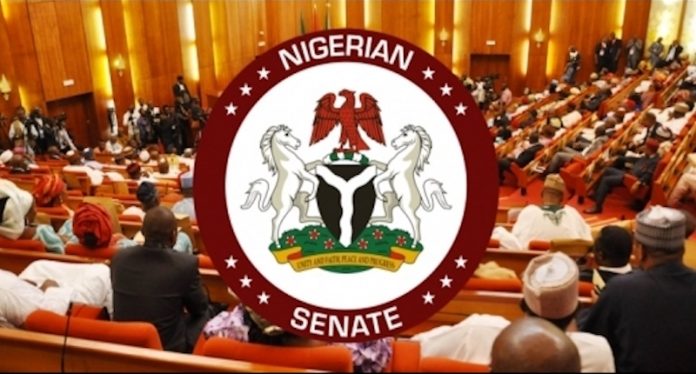*Urges FG to adopt balanced approach
Ndubuisi Francis in Abuja
The Senate Committee on Capital Market and Institutions, has raised concerns over a provision of the soon-to-be-implemented NigerianTax Act, 2025, urging the federal government not to enforce the aspect relating to Capital Gains Tax on January 1, 2026 until such concerns are addressed.
The Committee’s Chairman, Senator Osita Izunaso conveyed the concerns in Abuja, Wednesday in an address at the MoneyLine with Nancy Investment Forum 2025, themed, “Nigeria’s New Financial Landscape: Reforms, Risks, and the Road to Wealth Creation.”
According to Izunaso, through decisive reforms, macroeconomic stabilisation
and policies that have strengthened investor confidence, the Tinubu
administration had provided a foundation for sustainable growth in the apital
markets.
But, he expressed concerns that the impending Capital Gains Tax was already causing a run on the capital market as panicky investors had resorted to disposing their shares, resulting in a loss of N2 trillion on market capitalisation, last week alone.
He said, “However, a recent development under the Nigerian Tax Act 2025, the
increase of the Capital Gains Tax ont the sale of shares worth N150 million and above from 10% to 30% effective January 2026– has created understandable concern among investors.
“In anticipation of this change, we have observed significant disposals by major investors, resulting in a notable decline in market capitalisation over the past few days.
“As a matter of fact, the market lost over N2 trillion last week alone largely on account of this panic sale.
“While taxation isessential for revenue generation,it is equally critical
that fiscal measures do not inadvertently undermine investor confidence or discourafe long-term capital formation.”
He urged the Minister of Finance and Coordinating Minister of the Economy, Mr. Wale Edun to explore mechanisms to address this concern, by ensuring that both domestic and foreign investors remain engaged and confident in the Nigerian market.
According to him, a balanced approach would sustain the momentum, protect market stability, and preserve the positive trajectory that the capital markets have achieved under the current reforms.
The senator, who expressed his committee’s desire to meet with President Bola Ahmed Tinubu on the Capital Gains Tax issue, urged Edun to delay the proclamation on the commencement of that particular tax on January 1, 2026 until the concerns are addressed.
He applauded President Tinubu for assenting to the Investment and Securities Act (ISA 2025), noting that the Nigerian economy was at a pivotal juncture,
where structural reforms, fiscal discipline,and investment-friendly policies
are converging to redefine the nation’s financial and capital market architecture.
In his keynote address, the Governor of Akwa Ibom State, Umo Eno observed
that the introduction of bold fiscal and financial reforms , the Investment and Securities Act 2025, the Insurance Industry Reform Act 2025, the new Tax Laws, and the deregulation of the electricity market, marked a decisive shift in the national economic trajectory.
The govetnor who was represented by the state’s Commissioner for Information, Hon. Aniekan Umana, noted that Akwa Ibom had already commenced the process of taking ownership of its power sector, laying the groundwork that will enable it to generate, transmit, and distribute electricity within the state.
” It is through such deeper unbundling that subnational governments can truly serve the interests of their people, attract private capital, and accelerate industrialisation,” he said.
Eno urged states to drive productivity, innovation, and local enterprise, adding that to achieve this, there must be synergy between policy and people , between fiscal reform and financial education , between the boardroom and the marketplace.
“We must also be mindful of the risks that accompany reform — market volatility, inflationary pressures, and global uncertainties. Yet, within these risks lie opportunities to reinvent governance, promote inclusive growth, and leverage technology to deepen financial inclusion,” he admonished.
In her opening remarks, the convener of the investment forum, Mrs. Nancy Nnaji, stated that the goal of the event was to not only deepen understanding but to empower Nigerians with actionable knowledge, inspire collaboration across sectors, and promote responsible investment practices that will secure both individual and national prosperity.
“This forum, therefore, is more than a gathering; it is a strategic conversation about Nigeria’s rewritten financial landscape, one that has been reshaped by fiscal and monetary reforms, new regulatory directions, and evolving market realities.
“It provides an opportunity to understand the implications of these changes, assess the emerging risks, and identify the pathways that lead to inclusive and sustainable wealth creation,” she said.
Nnaji urged Nigerians to desist from investing in Ponzi schemes, lamenting that about 60 million people were involved in one firm of ponzi investment, betting or the other.
She, therefore, urged them to be financial active in regulated investment where their funds are guaranteed
